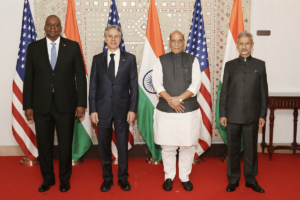 The Fifth Annual India-US 2+2 Ministerial Dialogue was held in New Delhi on November 10. Although this was a routine engagement between the two big powers, it drew significant attention, particularly from Bangladesh. This heightened interest stemmed from the anticipation that the matter of the upcoming election in Bangladesh would receive substantial consideration during the dialogue.
The Fifth Annual India-US 2+2 Ministerial Dialogue was held in New Delhi on November 10. Although this was a routine engagement between the two big powers, it drew significant attention, particularly from Bangladesh. This heightened interest stemmed from the anticipation that the matter of the upcoming election in Bangladesh would receive substantial consideration during the dialogue.
While the joint statement on the dialogue made no reference to the election, the Indian foreign secretary, Vinay Kwatra, disclosed that the issue had indeed been discussed between US and India. He stated during a post-dialogue press briefing, “The election in Bangladesh is their internal matter, and it is for the people of Bangladesh to decide their future.” He went on to emphasise, “As a close friend and partner of Bangladesh, we respect the domestic process there and will continue to support the country’s vision of a stable, peaceful, and progressive nation.”
This represents the most explicit Indian stance on Bangladesh’s election thus far. It contrasts sharply with their position in 2014 when the then Indian foreign secretary, Sujatha Singh, actively intervened to persuade opposition political parties, particularly Ershad’s Jatiya Party, to participate in an election that had been boycotted by BNP. But India may be refraining from active involvement this time due to considerable engagement of the US in Bangladesh’s ongoing electoral process.
Remarkably, India’s archrival, China, shares a similar perspective on the Bangladesh election. On November 9, the Chinese Ambassador to Bangladesh Yao Wen, reiterated his country’s position, stating, “Election is completely an internal issue of Bangladesh. Any decision regarding this shall be taken by the Bangladeshis.”
This alignment between India and China on the matter is quite unique in the context of South Asia, where the two nations have traditionally held opposing positions regarding the elections in countries of the region. A recent example is the Maldives election, widely framed as a showdown between China and India. The triumph of the pro-Chinese candidate, Mohamed Muizzu, over the pro-Indian Ibrahim Solih was interpreted as a victory for China. As anticipated, Muizzu promptly addressed the removal of Indian troops from the island nation’s soil.
Although there have been several hiccups, credit must be given to the Awami League regime for successfully maintaining a delicate balance between the opposing interests of China and India. It has provided substantial support to both countries, leading them to believe that their interests will be best served by the continuation of the current regime, even while ignoring the considerable risk of making their position unpopular to a wide section of the Bangladeshi people due to overlooking the democratic backsliding in the country.
It can reasonably be inferred from the comments made by the Indian foreign secretary that the ministerial dialogue did not succeed in bridging the gap between the divergent positions of the US and India regarding Bangladesh’s upcoming election. The prospect of reconciling these conflicting positions in the near future seems unlikely, given that our general election is merely two months away, and there is currently no plan for a high-level dialogue between the two countries before the election. The ruling party in Bangladesh may find this development frustrating, as it had anticipated that India would assist it in alleviating pressure from the US. Conversely, BNP might be disheartened witnessing the US’ inability to persuade India to adopt an impartial stance regarding the election.
Adding to BNP’s frustration is India’s sustained support for the AL-led government, despite its increasing crackdown on opposition activists. In response to a question about the widespread crackdown on BNP leaders and supporters, with around 10,000 individuals detained across Bangladesh, spokesperson for India’s Ministry of External Affairs, Arindam Bagchi, stated a day before the dialogue, “Crackdown, jailed opposition leader, etc, are your interpretation. Please don’t ascribe them to me. We do not want to comment on the policy of any third country. Elections in Bangladesh, as I have said, are a domestic matter for them. It is for the people of Bangladesh to decide their own future.”









